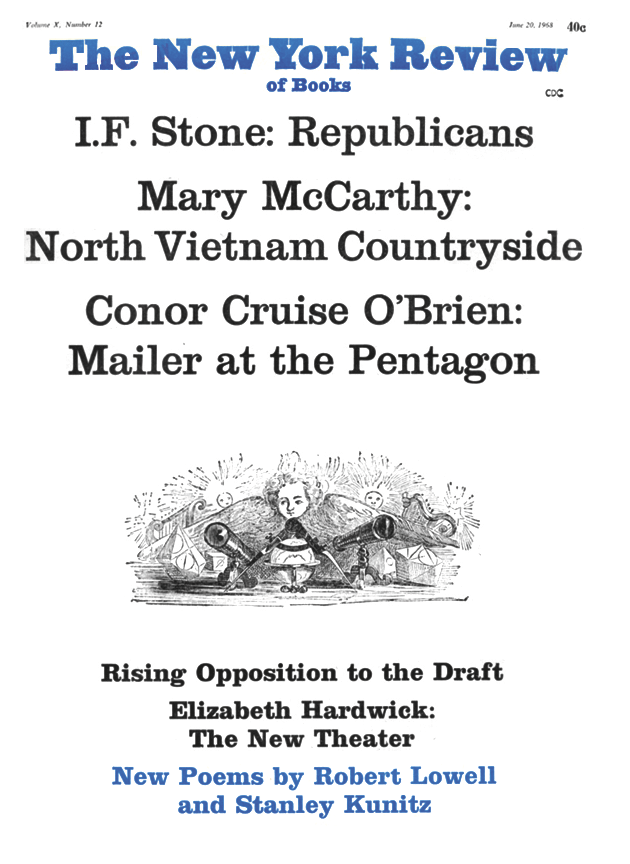In response to:
The Great Amateur from the March 14, 1968 issue
To the Editors:
Isaiah Berlin’s article on Herzen (NYR, March 14, 1968) is exceptionally well written, provocative and enlightening in many respects. There is, however, one rather glaring factual error which ought to be pointed out. Mr. Berlin refers to Herzen at some point around 1840 as having been a member of the same circle as Belinsky, Bakunin, Turgenev, and Katkov. In fact, there were two circles centered around Moscow University, the most influential of which was the circle of Nicholas Stankevich. Stankevich’s circle flourished in the 1830s and enlisted the loyalties of all of the above men at one time or another before the untimely and premature death of Stankevich in 1840 from tuberculosis. Herzen’s circle, to which his close friend Ogaryov belonged, was separate and came to an end in July, 1834, when he was arrested and exiled. He did not return to Moscow until 1842 when the Stankevich circle had disbanded and its members had gone their extremely varied ways; Bakunin to Germany and left Hegelianism, Belinsky to Petersburg and right Hegelianism, and Katkov to journalism in Petersburg.
Martin A. Miller
Department of History
Stanford University
Stanford, California
Isaiah Berlin replies:
Mr. Miller’s attempted correction of my facts is either irrelevant or mistaken. The two Circles of which he speaks, and the very cool relationship between them in the early 1830s is, perhaps, the most familiar of all pieces of knowledge in the field of nineteenth-century Russian history of ideas. There is not a textbook, however elementary, Soviet and non-Soviet, which does not dwell on this celebrated fact. But it has no bearing upon my description of Herzen towards the end of the 1830s and beginning of the next decade. Mr. Miller (relying I fear on some popular exposition) says that Herzen returned to Moscow only in 1842: but this is not the case. He was, it is true, fully pardoned only in 1842, but he was allowed to live in Vladimir by 1838, from which he paid several clandestine visits to Moscow, and he returned to Moscow more or less openly in late summer of 1839. In December he went to St. Petersburg and met Belinsky before the year was out; a correspondence between them began almost at once; Belinsky’s notorious “reconciliation with reality” caused a rift, ended only later in 1840. From then on there is an intimate relationship between them which remains uninterrupted despite Herzen’s exile to Novgorod in 1841. By 1843 Granovsky, Turgenev and Belinsky all saw a good deal of each other: they all stayed together in Herzen’s house in the country. It was during this time that the most passionate disputes about Hegel, Schiller, Schelling, etc. occured; it was the period of Granovsky’s famous Moscow lectures which marked the first great split between the Slavophiles and the “Westerns.” It was this group of writers of which Herzen was one of the leaders. According to Strakhov, an accurate reporter of Russian ideas, Herzen’s philosophical ascendancy was recognized at this time by Bakunin, Belinsky, and Granovsky. Mr. Miller, who thinks that Herzen remained in exile until 1842, naturally assumes that he could not have met Bakunin on his return, since Bakunin emigrated in 1840. I do not know whether Mr. Miller reads Russian. If not, Mr. E. H. Carr’s excellent biography of Bakunin (pp. 79-89) could inform him that Herzen was immensely impressed by Bakunin whom he met sometime in 1839-40, and that whatever Herzen’s opinion of Bakunin’s moral character, the personal bonds between them were lifelong. Indeed, it was Herzen alone who made it possible for Bakunin to go to Germany in 1840 by lending him a sufficient sum of money; and it was Herzen who saw him off at St. Petersburg, and thereafter followed his writings and career in the West with rapt attention, as his letters testify. These were the companions of Herzen’s intellectually formative years, the society in which the Russian intelligentsia was born, as Mr. Miller could learn if he turned to the classical work on this subject, Annenkov’s Remarkable Decade. The fact that Bakunin physically left it, although he remained in correspondence with its members, is neither here not there.
There is, of course, no reason why anyone but specialists should take any interest in the identity of Herzen’s intimate friends during these years: of these men, with of course Ogaryov; while the names of earlier friends (the “circle” before 1834) e.g. Sazonov, Pocheka, Noskov fade out of Herzen’s letters. But since Mr. Miller challenges my thesis, I am bound to restate these facts. The fact that Belinsky or Katkov (whose family were old friends of Herzen’s parents) lived in Petersburg, while Granovsky and Herzen lived in Moscow, did not prevent them from living an intense common intellectual life, sustained by correspondence and frequent visits. It is for these friends that the letters and articles from Paris after 1847 were written. These are “the men of the forties,” to whom all his life, Herzen was conscious of belonging. So much for Mr. Miller’s “glaring factual error.” I do not wish to question Mr. Miller’s good faith: he clearly thinks he is exposing a terrible howler. The facts, however, are what they are. Mr. Miller’s apparent ignorance of them does not alter them.
This Issue
June 20, 1968


